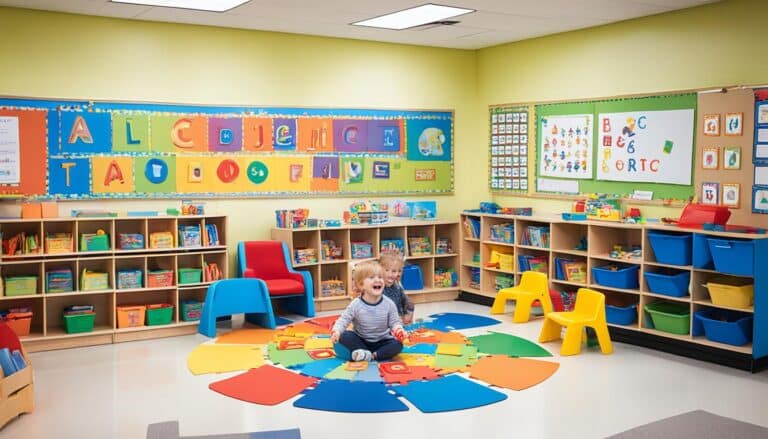Early Education Grants: Funding Your Teaching Dream
Are you an aspiring educator with big dreams of making a lasting impact on the lives of young learners? If so, early education grants can provide you with the funding you need to turn your teaching dream into a reality. These grants offer valuable financial support to educators who are passionate about creating a positive and enriching learning experience for children.
Securing early education grants is crucial for teachers who want to enhance their teaching methods, develop innovative programs, and provide resources that nurture the growth and development of young minds. By obtaining these grants, you can ensure that your classroom becomes an environment where every child has the opportunity to thrive and succeed.
Let’s delve into the different types of early education grants available and discover how they can help you on your journey to becoming an influential educator in the United States.
Key Takeaways:
- Early education grants offer financial support for educators who want to make a difference in young learners’ lives.
- Securing these grants can help teachers fulfill their educational vision and create a positive impact on children’s development.
- Various types of early education grants are available, offered by government agencies, educational institutions, and nonprofit organizations.
- Successfully securing early education grants requires careful planning, preparation, and a strong grant application.
- By following proper strategies and tips, you can increase your chances of securing the funds needed to make your teaching dream a reality.
Types of Early Education Grants
When it comes to funding opportunities for early education, there are various types of grants that educators can explore. These grants serve as valuable sources of financial assistance, enabling teachers to implement innovative and impactful educational programs. Let’s explore some common types of early education grants:
- Government Grants: Government agencies at the federal, state, and local levels offer grants specifically designed to support early education initiatives. These grants often have specific eligibility criteria and focus areas, such as enhancing curriculum development, improving teacher training, or promoting access to quality early childhood education.
- Educational Institution Grants: Many colleges, universities, and educational institutions have grant programs dedicated to early education. These grants may provide funding for research projects, classroom resources, professional development opportunities, or community outreach programs.
- Nonprofit Organization Grants: Nonprofit organizations devoted to early childhood education often offer grants to educators who demonstrate a commitment to improving the educational experiences of young children. These grants may support initiatives such as parent engagement programs, early literacy initiatives, or inclusive education projects.
Eligibility Criteria for Early Education Grants
Each type of early education grant has its own set of eligibility criteria that educators must meet to qualify for funding. Common eligibility requirements may include:
- Proof of employment as an educator in an early education setting
- Demonstration of the project’s alignment with the grant’s objectives and focus areas
- An articulated plan detailing how the grant funds will be utilized to benefit students and the educational community
- Submission of a comprehensive budget proposal outlining how the funds will be allocated
- Documentation of the project’s potential impact on student learning and development
Before applying for any early education grant, it is essential to thoroughly review the specific eligibility criteria provided by the grant-giving organization. This will ensure that the application process is approached strategically, increasing the chances of securing the desired funding.

Securing Early Education Grants
When it comes to securing early education grants, it’s essential to understand the grant application process and follow a few key tips for success. The grant application process can be competitive, but with careful planning and preparation, you can increase your chances of securing the funding you need to support your teaching dreams.
First and foremost, familiarize yourself with the grant application requirements. Each grant provider may have specific criteria and guidelines that must be met. Take the time to thoroughly review the application instructions, ensuring you understand what is expected and what supporting documents are required.
Next, highlight your qualifications and the impact your project or program will have on early education. Clearly articulate the goals, objectives, and outcomes of your proposal. Utilize data and research to back up your claims and demonstrate the potential effectiveness and importance of your project.
Lastly, pay attention to detail in your grant application. Ensure your application is well-written, free of errors, and easy to read. Use concise and persuasive language to convey your ideas effectively. Additionally, keep track of deadlines and submit your application well ahead of time to avoid any last-minute complications.
FAQ
What are early education grants?
Early education grants are funding opportunities available to educators who want to make a difference in the education and development of young learners.
Where do early education grants come from?
Early education grants can come from various sources such as government agencies, educational institutions, and nonprofit organizations.
What types of early education grants are available?
There are different types of early education grants, including grants for teacher training programs, classroom resources, research initiatives, and community outreach projects.
How can early education grants help aspiring teachers?
Early education grants provide financial support to aspiring teachers, helping them fulfill their teaching dreams and create a positive impact on the education and development of children.
How can I increase my chances of securing early education grants?
To increase your chances of success in the grant application process, it’s important to carefully plan and prepare. Some tips include researching grant opportunities, meeting eligibility criteria, creating a compelling grant proposal, and seeking guidance from experienced educators or grant writing professionals.
Source Links
- https://www.spokesman.com/stories/2024/feb/11/kitschy-fair-souvenirs-kids-letters-to-ford-design/
- https://main.hercjobs.org/jobs/19741127/esl-instructional-support-specialist
- https://www.wjbf.com/news/national/ap-us-news/ap-dexter-scott-king-remembered-during-memorial-as-keeper-of-his-father-martin-luther-king-jr-s-dream/






